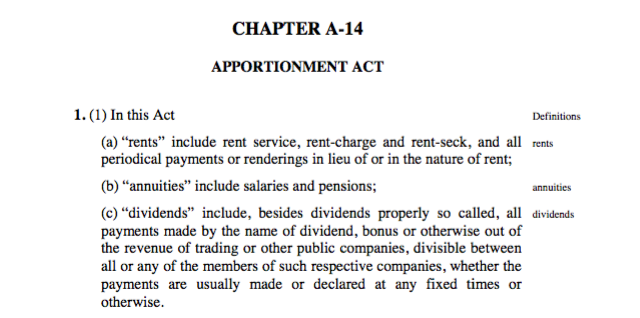When I started working with the Province of PEI on its website in 1995, Wordstar 2000 was the word processor used by most public servants in the province.
Within a few years it was largely replaced by WordPerfect and, years after that, by Word. Which is what’s mostly used today.
One of the last Wordstar 2000 holdouts in government was the Legislative Counsel Office, which drafts and maintains the province’s acts and regulations. They’d carefully worked out a system for laying out legislation in its section-by-section, clause-by-clause format, complete with the marginal notes.
It was this marginal material that was the fiddly bit; the words like “rents” and “dividends” in this example, that need to line up with what they refer to:
Those marginal notes are an important part of legislation, and long after the rest of the public service had moved on to WordPerfect, the Legislative Counsel Office continued to use Wordstar 2000 because of the difficulty of migrating and preserving this element of the layout.
It’s because of this that PEI was relatively late to getting its acts and regulations online: Wordstar 2000 provided no way of producing PDF files, and so we had to wait until it was replaced before legislation could go online as a collection of PDFs.
I was reminded of all of this when I came across John C. Dvorak’s Whatever Happened to Wordstar? essay today, a well-worded review of the history of Wordstar and its descendants.
Here’s the part where Wordstar 2000 comes along:
While Wordstar was still the best word processor on the market until the mid-1980’s it lacked a couple of features that annoyed users. As DOS was improved and UNIX-like paths were added, Wordstar could not initially accomodate paths. Worse it had no UNDO key. The code base by now was turning into spaghetti code and Barnaby wasn’t around to fix things. Worse, in 1985, the company produced Wordstar2000, a copy protected program that was nothing like the older lovable Wordstar and which contained annoying copy-protection features that scared most users away. While many pundits including Esther Dyson predicted great things for Wordstar2000, users rejected it. The product was big and slow and expensive. And despite complaints by the company and others, people wanted software they could copy and use on more than one machine. During this era piracy sold software and created market share. People would use a bootleg copy of Wordstar and eventually buy a copy. Wordstar may have been the most pirated software in the world, which in many ways accounted for its success. (Software companies don’t like to admit to this as a possibility.) Books for Wordstar sold like hot cakes and the authors knew they were selling documentation for pirated copies of Wordstar. The company itself should have just sold the documentation alone to increase sales. This was the wink-wink-nudge-nudge aspect of the industry at the time and everyone knew it. So when Wordstar2000 arrived with a copy protection scheme everyone should have predicted its immediate demise. By the time the company removed copy protection it was too late to save it. One curiosity was the 1985 release of Wordstar2000 for UNIX! Wordstar would later evolve into Wordstar professional and Wordstar for Windows (which developed a cult following), but it was an uphill battle despite superior usability. The edge was gone.
Wordstar was my first PC word processor (although I’d used various other programs on my TRS-80 Model One before I had a PC); I had flashbacks as I read Dvorak’s words about that “no UNDO key.” I seem to recall needing to rewrite many mis-deleted sections of many essays because of this lack-of-feature.
I skipped right over Wordstar 2000 to WordPerfect, and, for a time in the late 1980s I had a small side-practice in teaching the blind how to use it with a screen reader (thus forever having “WordPerfect. Orem, Utah. USA” burned into my eardrums: that’s how the screen reader started each time WordPerfect was launched).
WordPerfect was slow to be replaced in the public service too; long after most everyone else had moved on, I’d still get WPD files from government and I kept LibreOffice on my Mac around specifically to be able to open them. It was as recently as a couple of years ago that I got my last one.
I expect that if I looked through the attic of our house I’d find floppy disks with Wordstar, Wordstar 2000 and WordPerfect files on them. I think it’s probably high time to rescue whatever’s on them before that’s no longer possible. Indeed, maybe it’s already too late.

 I am
I am
Comments
when I go to school (Prince
when I go to school (Prince Street & Birchwood) in the aftermath of Wordstar2000 on PEI and none therefore I did not get on this path only the one for Word Perfect and Prince Edward Island's Microsoft's Other Own Applications to this day in School (Google For Education and Others Work Fine Too.) so Schools are part of the Government System.
But I do not know what Next
But I do not know what Next Year at Colonel Grey. Teachers and Students would use.
i mean will not would.
i mean will not would.
Add new comment